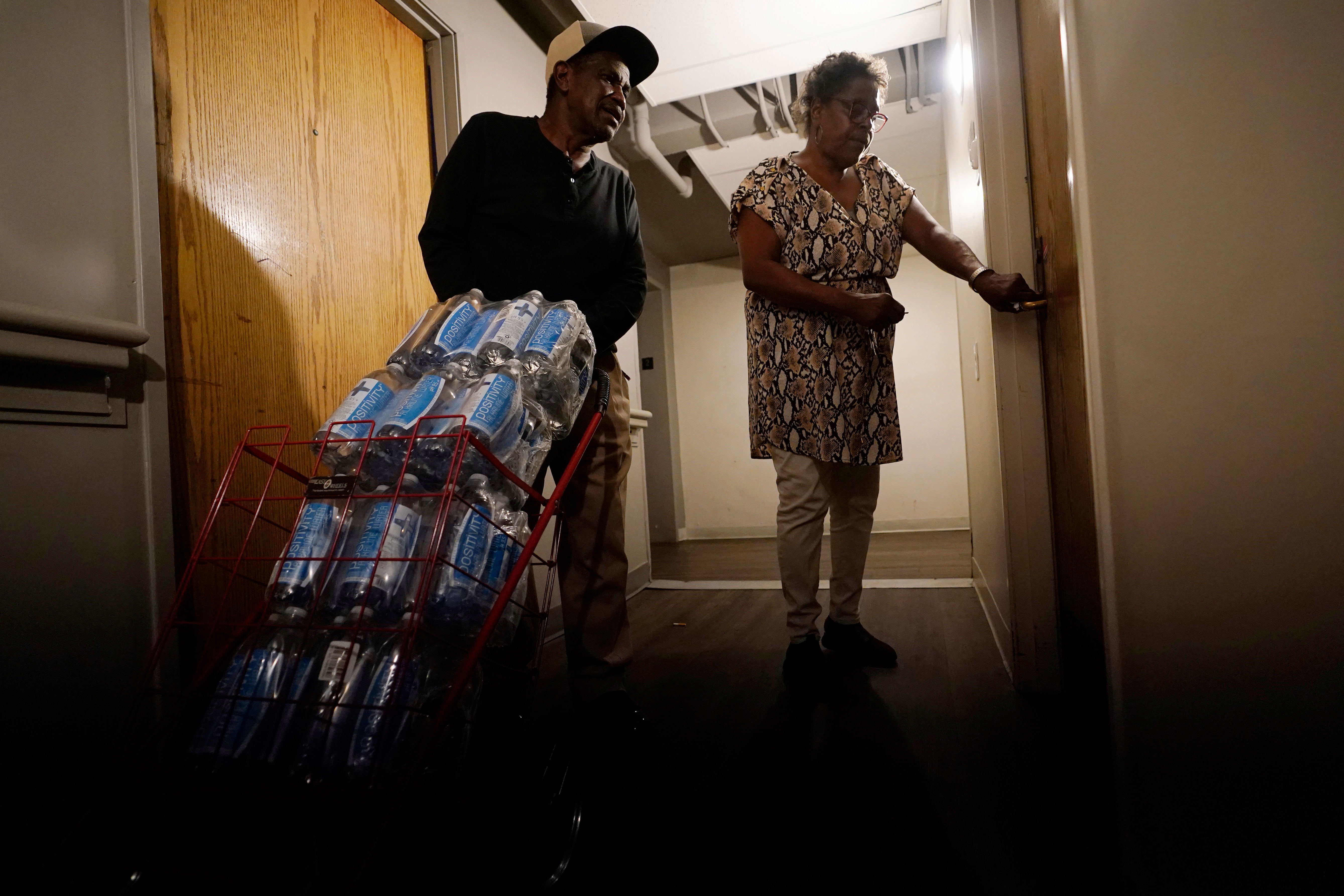The Independent's journalism is supported by our readers. When you purchase through links on our site, we may earn commission.
Republicans’ failure to act over Jackson water crisis is down to race and class prejudice
Mississippi’s GOP lawmakers have for years diverted funding away from the majority Black city towards wealthy white communities elsewhere in the state


Your support helps us to tell the story
From reproductive rights to climate change to Big Tech, The Independent is on the ground when the story is developing. Whether it's investigating the financials of Elon Musk's pro-Trump PAC or producing our latest documentary, 'The A Word', which shines a light on the American women fighting for reproductive rights, we know how important it is to parse out the facts from the messaging.
At such a critical moment in US history, we need reporters on the ground. Your donation allows us to keep sending journalists to speak to both sides of the story.
The Independent is trusted by Americans across the entire political spectrum. And unlike many other quality news outlets, we choose not to lock Americans out of our reporting and analysis with paywalls. We believe quality journalism should be available to everyone, paid for by those who can afford it.
Your support makes all the difference.“That water is as dark as strong coffee.”
That was my first thought when I saw the bathtub full of brown liquid Sydney Franks ran in her Jackson, Mississippi home. “Monday had no water, yesterday water was usable to flush toilets and they said we could boil it, but I didn’t use it,” she posted on Facebook on August 31. “Earlier today, no water at all.”
For years, the residents of Jackson have complained about the quality of their water. And for years, those complaints have fallen on deaf ears in this ruby red state. Jackson may be the seat of power in the Magnolia State, but it is far from powerful in a state that only last year removed the Confederate battle flag from its own state flag.
A majority Black and deeply impoverished city, Jackson has long been neglected by the state. This, despite decades of complaints from residents about the quality of their water and infrastructure. The water crisis is the nexus of that racism and classism manifesting itself in one of the greatest public health crises in the nation.
By now, the residents of Jackson – the capital of Mississippi and home to more than 163,000 people – has been without clean water for over a week, the result of historic flooding of the nearby Pearl River. Yesterday, water pressure was finally restored. “There may be more bad days in the future,” Mississippi Governor Tate Reeves, a Republican, said. “We have, however, reached a place where people in Jackson can trust that water will come out of the faucet. People in Jackson can trust the toilets can be flushed.”
What a shockingly low bar for a city in the wealthiest nation in the world. Notice Reeves did not say the water was drinkable. A boil water advisory remains in effect, as it has since July 30. The city hopes to be able to lift it later this week, but even that is a hollow victory. Reeves is already floating the idea of privatizing the city’s water, a move which would drive up costs and diminish accountability.
Privatization would be disastrous for Jacksonians – just as Republican neglect has been. While water and other utilities are often the purview of local governments, Jackson is a struggling city in need of state help. As Jarvis DeBerry, a Jackson native, wrote for MSNBC, “racist white flight” contributed to a 25 percent population decrease between 1980 and 2020.
The result is that Jackson is now 82.5% Black, according to Census Bureau statistics. Less than half the city’s residents own their own homes, and only 28% have college degrees. Nearly a quarter of the city’s population lives in poverty.
All this means that the city has little tax base of its own. This, in turn, has contributed to a woefully underfunded budget; the 2021-22 budget was only $400 million. It will take $2 billion to fix the problems with the city’s water and sewer system, DeBerry writes.
In a just world, this is where the state government would step in. That hasn’t happened, though. I’ll give you one guess why.
Republicans have long controlled Mississippi. The state has not had a Democratic governor since 2004. Both houses of the legislature have been controlled by the GOP since 2012.
Jackson, meanwhile, is a heavily Democratic city. Its mayor is a Democrat. Most of the city has been represented by Bennie Thompson – currently chair of the January 6 select committee – since 1993.
Even though Jackson is the state capital, those Republicans have for years redirected funding away from the city and towards wealthy white communities elsewhere in the state. They have also, unsurprisingly, repeatedly opposed infrastructure upgrades. Calling the state legislature both “paternalistic” and “racist” earlier this year, Jackson Mayor Chokwe Antar Lumumba accused the state legislature of not only underfunding the necessary repairs to city infrastructure, but of attaching strings and oversight requirements not attached to other (presumably whiter) municipalities. Mississippi Today reported that he openly wondered “Jackson has an equal-protection claim against the state of Mississippi.” He also noted that while the state legislature did earmark $25 million for improvements to the city, it also earmarked $13 million for a golf course in Jackson, money that could have – should have – gone towards improving the city’s crumbling infrastructure.
Lumumba did not file a lawsuit back in April, when he made those remarks. He would be wise to consider it now. After all, the water problems in Jackson are not new. For years, residents have complained about the water in Jackson. And for years, the state has ignored them.
The Clarion-Ledger, arguably Mississippi’s newspaper of record, reports that water line breaks in 2010 disrupted water pressure and forced the closure of several University of Mississippi Medical Center clinics. The city was under a boil-water advisory in 2015, though many residents were hesitant to drink the cloudy brown water coming out of their faucets and complained about the quality and ongoing issues with the city’s water supply.
Last year residents, again under a boil-water notice, complained that the water had a foul smell. “It’s not drinkable,” Jackson resident Antonio Thomas told WAPT-TV, an ABC affiliate in the city. “I can’t describe the smell, because I’ve never smelled any water that smells like it.”
No one listened then, and Republicans in Mississippi are not listening now. Instead, Reeves salivates over the possibility of privatizing a basic human right – the right to clean drinking water. It’s ghoulish.
Republican refusal to listen and to act – unless it is to act against the interests of Jackson – is nothing short of classism and racism. In 2016, the state legislature voted to bring control of the Jackson-Medgar Wiley Evers International Airport under a regional authority, thus eliminating a vital revenue stream for the city.
That the water crisis in Jackson has not been addressed is a dereliction of duty and governmental malpractice on the part of the Republicans controlling Mississippi. It is also morally reprehensible. Jackson has the fifth-lowest per capita income of any city in Mississippi. Its residents are largely poor and working-class people of color, some of the most powerless in our nation.
Yet their own government has for decades refused to even acknowledge that they need help, as if Black and brown people drinking black and brown water is of no concern to the white power structure in the state. But no more. The citizens of Jackson deserve better from their state government.
Rather than eliminating revenue streams and privatizing public services like water, Tate Reeves and his ilk need to act to address the woeful state of not only Jackson’s water, but its infrastructure. This is his – and his Republican legislature’s – responsibility.
Brown water stains. It has already stained Reeves’ legacy. The failure to act now, though, will be a stain is upon the entire state of Mississippi – one that is not easily washed away.
Join our commenting forum
Join thought-provoking conversations, follow other Independent readers and see their replies
Comments